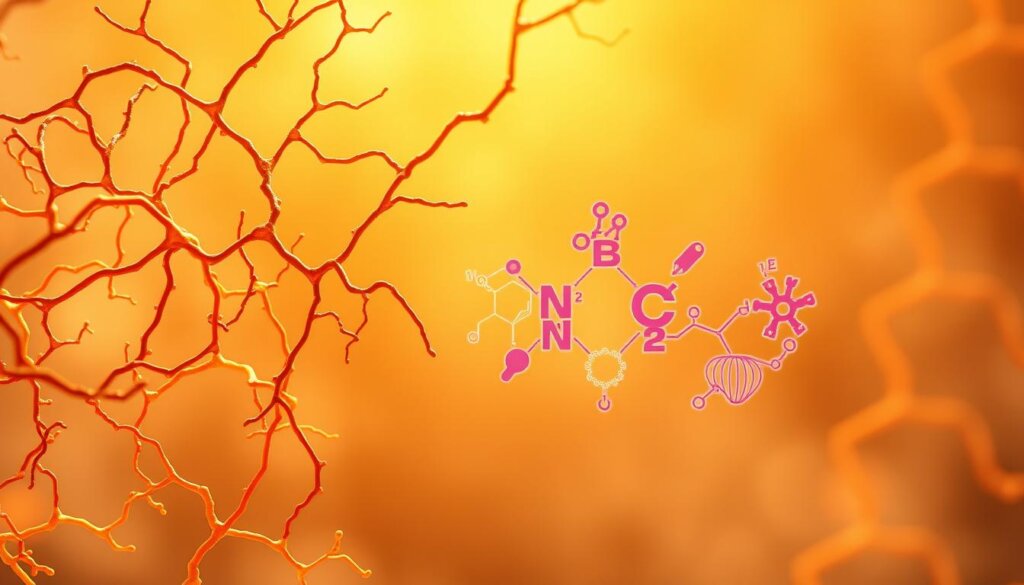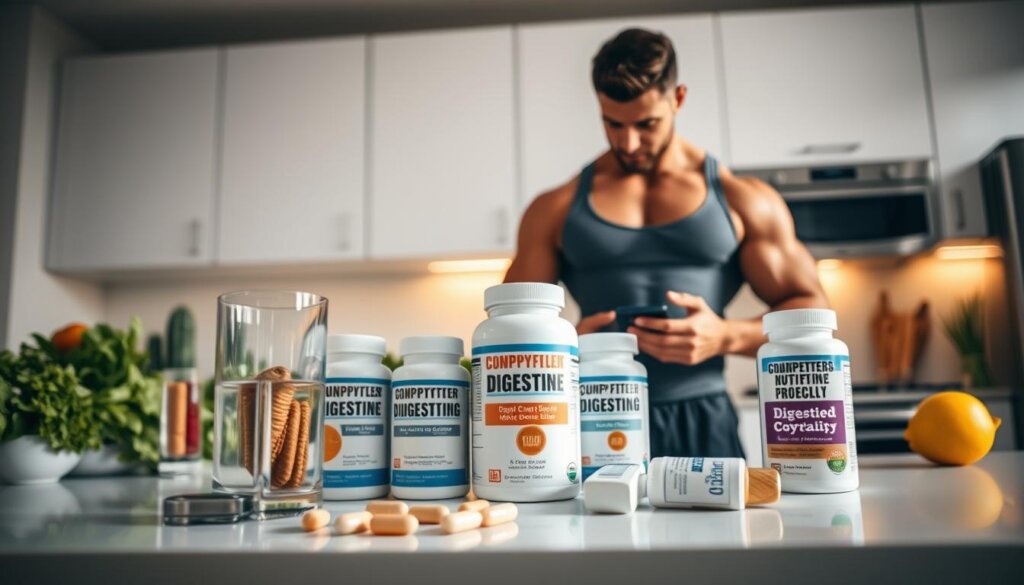Wellness Group: Enzyme Fiber for Bodybuilders Digestion Support
Did you know 73% of competitive athletes experience gut discomfort during training cycles? For those pushing physical limits, maintaining peak performance goes beyond workouts—it starts with how the body processes nutrients.
Intense training demands precise nutrition, yet many struggle to absorb essential macros efficiently. High-protein diets and calorie restrictions often create strain, leaving athletes feeling sluggish or bloated. This gap between intake and absorption can derail progress.
Specialized blends now address these challenges by enhancing natural processes. Three core components—proteases, lipases, and amylases—work synergistically to break down proteins, fats, and carbs. When production lags, targeted supplementation bridges the gap, ensuring meals fuel growth rather than discomfort.
Wellness Group focuses on science-backed solutions tailored for active lifestyles. Their approach combines cutting-edge research with practical strategies, helping athletes optimize meals without digestive setbacks. Whether preparing for competitions or maintaining gains, smart support makes all the difference.
Key Takeaways
- Over two-thirds of athletes report gut issues during intense training phases
- Macro-heavy diets require efficient nutrient breakdown for maximum benefit
- Targeted formulas address protein, fat, and carbohydrate digestion separately
- Strategic supplementation prevents common issues like bloating and fatigue
- Custom solutions adapt to varying training intensities and dietary needs
Understanding Digestive Enzymes and Gut Health

Click to LEARN MORE
Optimal performance starts long before you hit the gym—it begins in your gut. The human body relies on specialized proteins to convert meals into energy. These biological catalysts work tirelessly to break down nutrients, ensuring every bite supports muscle repair and growth.
The Science of Nutrient Breakdown
Three primary enzymes dominate the digestive process. Proteases dismantle proteins into amino acids, while lipases handle fats. Amylases target carbohydrates, splitting them into simple sugars. The pancreas produces most of these helpers, but the small intestine adds finishing touches with specialized varieties like lactase.
| Enzyme | Source | Function |
|---|---|---|
| Protease | Pancreas | Breaks proteins into amino acids |
| Lipase | Liver | Dissolves fats for absorption |
| Amylase | Salivary glands | Converts carbs to sugars |
| Bromelain | Pineapple | Assists protein digestion |
Nature’s Digestive Allies
Certain foods supercharge the digestive system. Pineapple contains bromelain, a protease that eases meat digestion. Fermented options like kimchi deliver multiple enzyme types while supporting gut health. Including these in meals helps maintain natural nutrient processing without synthetic aids.
When the system functions smoothly, nutrients flow steadily into the bloodstream. This prevents energy crashes during workouts and supports consistent muscle development. Simple dietary tweaks often make the difference between stagnation and gains.
Strategies to Use Enzyme Fiber for Bodybuilders Digestion
Breaking down nutrients efficiently becomes crucial when every calorie counts. Athletes pushing their limits need solutions that work as hard as they do. Smart combinations of natural compounds offer targeted support for high-performance diets.

Science-Backed Formulations
Research reveals powerful synergies in multi-action blends. A 2022 study found papaya-based formulas reduced bloating by 41% in athletes during cutting phases. Bromelain—a pineapple extract—shows dual benefits: tenderizing proteins in meals and enhancing their breakdown internally.
Combining bromelain with pancreatic digestive enzymes creates a 30% improvement in protein absorption, according to clinical trials. This approach addresses both dietary preparation and internal processing—a game-changer for meal-prepping competitors.
Performance-Enhancing Advantages
Key benefits for serious trainers include:
- Reduced digestive stagnation during calorie deficits
- Faster nutrient delivery to muscles post-workout
- Natural anti-inflammatory effects aiding recovery
Many find these blends more effective than single-ingredient options. As highlighted in our guide on the difference between probiotics and enzymes, strategic pairing matters. The fiber component keeps things moving smoothly, preventing the “heavy gut” feeling common with high-protein diets.
Regular users report better energy consistency during workouts and quicker rebound between sessions. It’s not just about avoiding discomfort—it’s about unlocking full nutritional potential from every meal.
Practical Steps for Optimizing Digestion
Smart nutrition strategies turn meals into muscle-building fuel. Pairing the right foods with intentional timing unlocks their full potential, keeping energy levels steady and discomfort at bay.
Powerful Food Pairings
Nature offers tasty solutions for nutrient breakdown. Pineapple chunks before a chicken breast meal prep your system with bromelain to help break proteins. Papaya slices after lunch deliver papain to tackle heavy meat dishes. Mango in morning oats introduces amylase for carb-heavy days.
Try these combinations:
- Banana + peanut butter: Enzymes handle carbs and fats simultaneously
- Ginger tea 15 minutes before salmon: Zingibain primes protein digestion
- Avocado in spinach salads: Lipase supports fat absorption from greens
Consistency Creates Results
Regular habits amplify digestive enzymes’ effectiveness. Eat pineapple daily during mass-gain phases when protein intake peaks. Blend papaya into post-workout shakes for consistent enzyme support. Keep ginger shots handy for heavy eating days.

Click to LEARN MORE
Track how these tweaks affect your energy and recovery. Many athletes find improved nutrient uptake within 3 weeks of strategic food timing. Like training schedules, meal routines need adjustment as goals evolve.
Small changes yield big differences. Rotate enzyme-rich foods seasonally to maintain gut adaptability. Your system thrives on variety as much as consistency.
Managing Digestive Challenges During Bodybuilding Prep
Competition preparation tests more than physical limits—it challenges the entire digestive system. Reduced food portions and high-protein meals create a tug-of-war between nutrient needs and gut health. Strategic adjustments help maintain momentum while keeping discomfort at bay.

Overcoming Bloating and Gas Issues
High-protein diets often clash with the body’s ability to process dense meals efficiently. Common culprits include:
- Dairy products and wheat-based foods triggering allergic reactions
- FODMAP-rich items like avocado or yogurt fermenting in the gut
- Cruciferous vegetables causing gas when eaten before workouts
Stress compounds these problems by activating fight-or-flight responses. This slows the digestive tract, leaving food to stagnate. Temporarily eliminating trigger foods during peak prep phases often brings relief.
Addressing Constipation and Slow Digestion
When food volume drops, fiber intake usually follows. This double whammy leads to sluggish bowel movements that can stall progress. Solutions include:
- Timing fiber-rich vegetables away from posing practice
- Using gentle magnesium supplements to support regularity
- Practicing diaphragmatic breathing to activate rest-and-digest mode
“Digestive slowdown isn’t just uncomfortable—it directly impacts how efficiently nutrients get used,” notes a sports nutrition study. Staying hydrated and managing stress levels helps maintain steady momentum through tough prep phases.
Creating a Balanced Diet for Effective Digestion
Building muscle requires more than protein shakes and portion control—it demands smart nutrient pairing. Proper elimination and nutrient absorption rely on two often-overlooked components: water intake and strategic fiber combinations. Getting this balance right keeps energy levels stable and training sessions productive.
Balancing Proteins, Carbs, and Fiber
The gut thrives on variety. Soluble fibers like oats and flaxseed act like sponges, absorbing water to create smoother digestion. Insoluble varieties from veggies and whole grains add bulk, keeping things moving naturally. Together, they form a dynamic duo for digestive health.
| Fiber Type | Best Sources | Key Benefit |
|---|---|---|
| Soluble | Oatmeal, beans, nuts | Softens stool |
| Insoluble | Broccoli, apples, brown rice | Prevents constipation |
Start small when boosting fiber intake—add 5 grams weekly to avoid gas or cramping. This gradual approach gives the system time to adapt while maintaining amino acid absorption from protein sources.
Time carb-rich meals around workouts when the body needs quick energy. Choose fruits like bananas or berries that naturally help break carbs into usable fuel. Pair them with lean proteins post-training for muscle repair without digestive strain.
Consistency matters most. Track how different food combinations affect energy levels and recovery. Many athletes notice improved gut health within weeks of implementing these adjustments.
Lifestyle Adjustments for Enhanced Digestive Health
True wellness extends beyond the plate—it thrives in daily habits that support the whole system. Small changes in mindset and routine create lasting effects on how the body processes nutrients, especially during intense training phases.
Stress Management and Recovery Techniques
Chronic tension disrupts the gut-brain connection, slowing nutrient processing. Simple practices like 10-minute meditation sessions or leisurely walks activate the body’s rest-and-digest mode. Smart time management prevents task overload, reducing strain on the system.
Importance of Adequate Sleep and Hydration
Deep sleep cycles repair the gut lining and boost enzyme production. Aim for 7-9 hours nightly to maintain digestive health. Pair this with consistent water intake—hydration keeps food moving smoothly through the system, preventing sluggishness.
Balancing these elements supports both physical health and mental clarity. Track energy levels weekly to spot patterns. When building strength, remember: sustainable progress stems from nurturing the whole body, not just the muscles.
FAQ
How do digestive enzymes help with bloating during intense training?
They break down complex nutrients like proteins and carbs, reducing undigested food that can cause gas. Supplements like NOW Foods Super Enzymes or Garden of Life’s blend may ease discomfort when taken with meals.
Can a high-protein diet slow digestion for athletes?
Yes, excessive protein without enough fiber or hydration may lead to sluggish gut function. Pairing lean meats with veggies, quinoa, or chia seeds balances intake and supports regularity.
What foods naturally boost enzyme activity for better nutrient absorption?
Pineapple (bromelain), papaya (papain), ginger, and fermented items like kimchi or kefir enhance breakdown of fats, starches, and proteins. Including these daily aids smoother digestion.
Are there risks to using enzyme supplements long-term?
Most blends, such as Pure Encapsulations Digestive Enzymes, are safe when used as directed. However, consulting a healthcare provider ensures they align with individual needs and avoid over-reliance.
How does stress impact gut health during competition prep?
Chronic stress disrupts the gut-brain axis, worsening issues like constipation. Techniques like deep breathing, yoga, or prioritizing 7–9 hours of sleep help maintain balance.
What’s the best way to manage fiber intake without causing discomfort?
Gradually increase sources like oats, lentils, or psyllium husk while drinking plenty of water. Pairing with probiotic-rich yogurt or kombucha can also ease transitions.
Can pre-workout meals trigger acid reflux for lifters?
Spicy, fatty, or acidic foods close to training may irritate the stomach. Opting for easily digestible options like rice cakes, bananas, or almond butter 1–2 hours earlier minimizes risks.

Khloe Tan
Khloe Tan is a Certified Nutritionist, Corporate Wellness Trainer, and Holistic Health Specialist with over 15 years of experience in the health and wellness industry. She has delivered more than 100 talks nationwide, inspiring and educating diverse audiences on nutrition, lifestyle, and sustainable wellness. Her work has positively impacted over 3,000 lives, and she continues to champion holistic approaches to well-being in both corporate and personal settings.
Feature Product
-
Hydrogen Water FIlter/Generator
H2zen Portable (White/ Blue)
RM2,600.00 Add to cart Buy NowRated 0 out of 5





